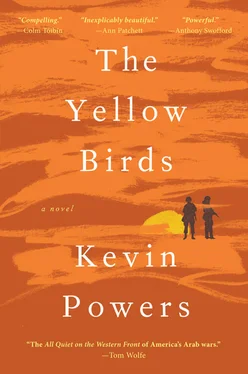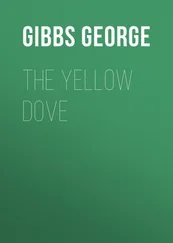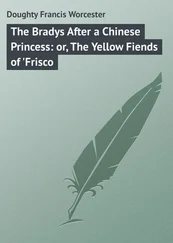At daybreak on the first day our interpreter, Malik, came out onto the flat concrete roof and sat next to me where I leaned against the wall. It was not yet light, but it almost appeared to be because the sky was white the way the sky is when heavy with snow. We heard fighting across the city, but it had not reached us yet. Only the noise of rockets and machine guns and helicopters swooping down near vertical in the distance told us we were in a war.
“This is my old neighborhood,” he told me.
His English was exceptional. There was a glottal sound in his voice, but it was not harsh. I’d often asked him to help me with my sparse Arabic, trying to get my pronunciation of this or that word right. “Shukran.” “Afwan.” “Qumbula.” Thank you. You’re welcome. Bomb. He’d help, but he always ended our exchanges by saying, “My friend, I need to speak English. For the practice.” He’d been a student at the university before the war, studying literature. When the university closed, he came to us. He wore a hood over his face, worn khaki slacks and a faded dress shirt that appeared to be ironed freshly every day. He never took his mask off. The one time Murph and I had asked him about it, he took his index finger and traced the fringe of the hood that hung around his neck. “They’ll kill me for helping you. They’ll kill my whole family.”
Murph hunched low and trotted over from the other side of the roof where he had been helping the LT and Sterling set up the machine gun after we’d arrived. Watching him move, I got the impression that the flatness of the desert made him nervous. That somehow the low ridgelines in the distance made the dried brown grasses of the floodplain even more unbearable.
“Hey, Murph,” I said. “This is Malik’s old stomping grounds.”
Murph ducked quickly and sat next to the wall. “Whereabouts?” he asked.
Malik stood up and pointed to a strip of buildings that seemed to grow organically in odd, not quite ninety-degree sections. The buildings stood beyond the field at the beginning of our sector. A little farther past the outskirts of Al Tafar, there was an orchard. Fires burned from steel drums and trash heaps and sprung up seemingly without cause around the edges of the city. Murph and I did not stand up, but we saw where Malik pointed.
“Mrs. Al-Sharifi used to plant her hyacinth in this field.” He spread his hands out wide and moved his arms in a sweeping motion that reminded me of convocation.
Murph reached for the cuff of Malik’s pressed shirt. “Careful, big guy. You’re gonna get silhouetted.”
“She was this crazy old widow.” He had his hands on his hips. His eyes were glazed over with exhaustion. “The women in the neighborhood were so jealous of those flowers.” Malik laughed. “They accused her of using magic to make them grow the way they did.” He’d paused then, and put his hands on the dried mud wall we’d been leaning against. “They were burned up in the battle last fall. She did not try to replant them this year,” he finished brusquely.
I tried to imagine living there but could not, even though we had patrolled the same streets Malik was talking about and drank tea in the small clay hovels and I’d had my hands wrapped in the thinly veined hands of the old men and women who lived in them. “All right, buddy,” I said. “You’re gonna get your ass shot off if you don’t get down.”
“It is a shame you didn’t see those hyacinths,” he said.
And then it started. It seemed as if the movement of one moment to the next had its own trajectory, a thing both finite and expansive, like the endless divisibility of numbers strung out on a line. The tracers reached out from all the dark spaces in the buildings across the field, and there were many more bullets than streaks of phosphorescence. We heard them tear at the air around our ears and smack into the clay brick and concrete. We did not see Malik get killed, but Murph and I had his blood on both of our uniforms. When we got the order to cease fire we looked over the low wall and he was lying in the dust and there was a lot of blood around him.
“Doesn’t count, does it?” Murph asked.
“No. I don’t think so.”
“What’re we at?”
“Nine sixty-eight? Nine seventy? We’ll have to check the paper when we get back.”
I was not surprised by the cruelty of my ambivalence then. Nothing seemed more natural than someone getting killed. And now, as I reflect on how I felt and behaved as a boy of twenty-one from my position of safety in a warm cabin above a clear stream in the Blue Ridge, I can only tell myself that it was necessary. I needed to continue. And to continue, I had to see the world with clear eyes, to focus on the essential. We only pay attention to rare things, and death was not rare. Rare was the bullet with your name on it, the IED buried just for you. Those were the things we watched for.
I didn’t think about Malik much after that. He was an incidental figure who only seemed to exist in his relation to my continuing life. I couldn’t have articulated it then, but I’d been trained to think war was the great unifier, that it brought people closer together than any other activity on earth. Bullshit. War is the great maker of solipsists: how are you going to save my life today? Dying would be one way. If you die, it becomes more likely that I will not. You’re nothing, that’s the secret: a uniform in a sea of numbers, a number in a sea of dust. And we somehow thought those numbers were a sign of our own insignificance. We thought that if we remained ordinary, we would not die. We confused correlation with cause and saw a special significance in the portraits of the dead, arranged neatly next to the number corresponding to their place on the growing list of casualties we read in the newspapers, as indications of an ordered war. We had a sense, something we only felt in the brief flash of synapse to synapse, that these names had been on the list long before the dead had come to Iraq. That the names were there as soon as those portraits had been taken, a number given, a place assigned. And that they’d been dead from that moment forward. When we saw the name Sgt. Ezekiel Vasquez, twenty-one, Laredo, Texas, #748, killed by small-arms fire in Baqubah, Iraq, we were sure that he’d walked as a ghost for years through South Texas. We thought he was already dead on the flight over, that if he was scared when the C-141 bringing him to Iraq had pitched and yawed through the sky above Baghdad there had been no need. He had nothing to fear. He’d been invincible, absolutely, until the day he was not. The same, too, for Spc. Miriam Jackson, nineteen, Trenton, New Jersey, #914, dead as a result of wounds sustained in a mortar attack in Samarra, at Landsthul Regional Medical Center. We were glad. Not that she was killed, only that we were not. We hoped that she’d been happy, that she took advantage of her special status before she inevitably arrived under that falling mortar, having gone out to hang her freshly washed uniform on a line behind her connex.
Of course, we were wrong. Our biggest error was thinking that it mattered what we thought. It seems absurd now that we saw each death as an affirmation of our lives. That each one of those deaths belonged to a time and that therefore that time was not ours. We didn’t know the list was limitless. We didn’t think beyond a thousand. We never considered that we could be among the walking dead as well. I used to think that maybe living under that contradiction had guided my actions and that one decision made or unmade in adherence to this philosophy could have put me on or kept me off the list of the dead.
I know it isn’t like that now. There were no bullets with my name on them, or with Murph’s, for that matter. There were no bombs made just for us. Any of them would have killed us just as well as they’d killed the owners of those names. We didn’t have a time laid out for us, or a place. I have stopped wondering about those inches to the left and right of my head, the three-miles-an-hour difference that would have put us directly over an IED. It never happened. I didn’t die. Murph did. And though I wasn’t there when it happened, I believe unswervingly that when Murph was killed, the dirty knives that stabbed him were addressed “To whom it may concern.” Nothing made us special. Not living. Not dying. Not even being ordinary. Still, I like to think there was a ghost of compassion in me then, and that if I’d had a chance to see those hyacinths I would have noticed them.
Читать дальше












